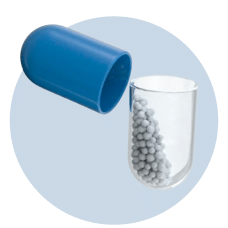Welset DS 250mg Suspension
Your child’s medicine at a glance
Welset DS 250mg Suspension is given orally, preferably at a fixed time every day. Though this medicine can be taken with or without food, it is best given after food, as Welset DS 250mg Suspension can irritate the inner lining of an empty stomach. The dose and duration will depend upon your child’s age, body weight, and severity of the infection, so stick to the dose, time, and way prescribed by your child’s doctor. If your child vomits within 30 minutes of taking the medicine, let the child calm down and repeat the same dose. Redosing is not recommended if your child experiences any allergic reaction within 30 minutes after taking a dose.
Do not give your child Welset DS 250mg Suspension along with other medicines (many cold and flu medicines and other painkillers) that contain paracetamol, as this may result in overdosing and cause dangerous side effects such as hepatotoxicity (liver damage). Always check the ingredients of any other medicines before giving them to your child in combination with this medicine.
Generally, Welset DS 250mg Suspension is well-tolerated by the children. However, temporary side effects such as indigestion, nausea, and vomiting may occur in some children. Consult your doctor in case these episodes become bothersome for your child.
Welset DS 250mg Suspension is often considered safe and effective, but may not be suitable for everybody. Inform your doctor if your child is undergoing treatment for any blood-related disorder, is allergic to any medicinal compound, or has any birth defects, liver impairment, or kidney dysfunction. This will help your child’s doctor evaluate the dose and suitability of this medicine in a better way.
Uses of Welset DS 250mg Suspension in children
Benefits of Welset DS 250mg Suspension for your child
In Pain relief
In Treatment of Fever
Side effects of Welset DS 250mg Suspension in children
Common side effects of Welset
- Indigestion
- Nausea
- Vomiting
- Stomach pain
How can I give Welset DS 250mg Suspension to my child?
How Welset Suspension works
Safety advice
However, the use of Welset DS 250mg Suspension is not recommended in children with severe liver disease and active liver disease.
What if I forget to give Welset DS 250mg Suspension to my child?
All substitutes
Quick tips
- Give Welset DS 250mg Suspension to your child with food or milk to prevent an upset stomach.
- Never give any other medicine formulation containing paracetamol along with this medicine, as that may lead to serious side effects.
- Inform the doctor if your child has liver disease, as the dose may need to be adjusted.
- If Welset DS 250mg Suspension does not seem to be helping your child, contact your doctor for advice. Do not give extra doses.
Fact Box
Interaction with drugs
Patient concerns
FAQs
How much Welset DS 250mg Suspension should I give to my child?
When will my child’s condition improve after taking Welset DS 250mg Suspension?
Can I give Welset DS 250mg Suspension to my child for low-grade fever?
My child’s fever is persistent even after taking Welset DS 250mg Suspension. What should I do?
How much of Welset DS 250mg Suspension is considered as an overdose?
Where should I store this medicine?
In what conditions Welset DS 250mg Suspension must be given with caution?
Can I give Welset DS 250mg Suspension on a routine basis when my child is taking a vaccine?
Does Welset DS 250mg Suspension make babies sleepy?
Disclaimer:
Tata 1mg's sole intention is to ensure that its consumers get information that is expert-reviewed, accurate and trustworthy. However, the information contained herein should NOT be used as a substitute for the advice of a qualified physician. The information provided here is for informational purposes only. This may not cover everything about particular health conditions, lab tests, medicines, all possible side effects, drug interactions, warnings, alerts, etc. Please consult your doctor and discuss all your queries related to any disease or medicine. We intend to support, not replace, the doctor-patient relationship.References
- Grosser T, Smyth E, FitzGerald GA. Anti-Inflammatory, Antipyretic, and Analgesic Agents; Pharmacotherapy of Gout. In: Brunton LL, Chabner BA, Knollmann BC, editors. Goodman & Gilman’s: The Pharmacological Basis of Therapeutics. 12th ed. New York, New York: McGraw-Hill Medical; 2011. pp. 982-84.
Marketer details
The list of available options shown with the same composition has been prepared upon the advice of registered medical practitioners, pharmacists affiliated with TATA 1MG. TATA 1MG does not promote any pharmaceutical product of any particular company, and all recommendations are based on the medical opinion, advisories from specialist medical and pharmaceutical professionals.
Lab tests offered by us











